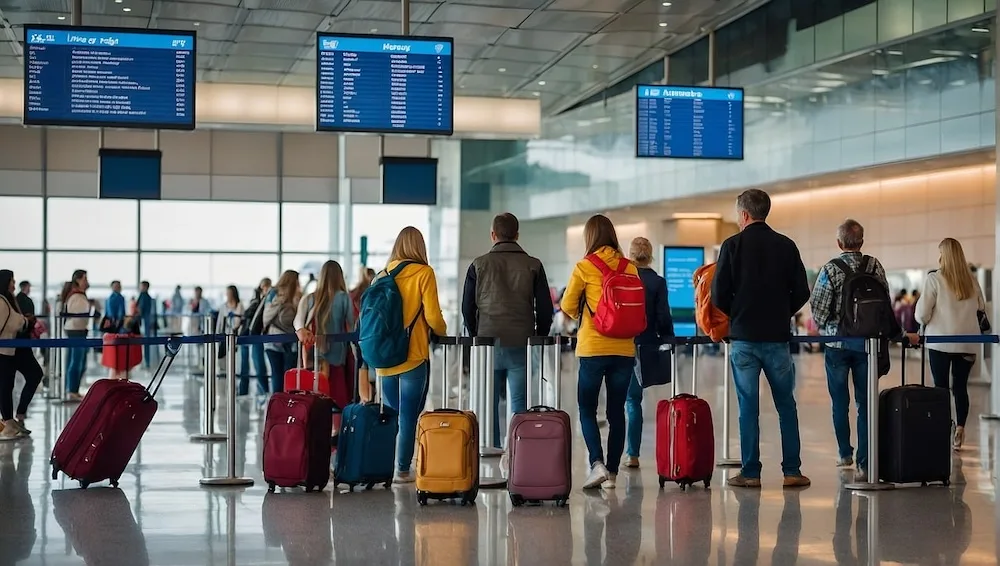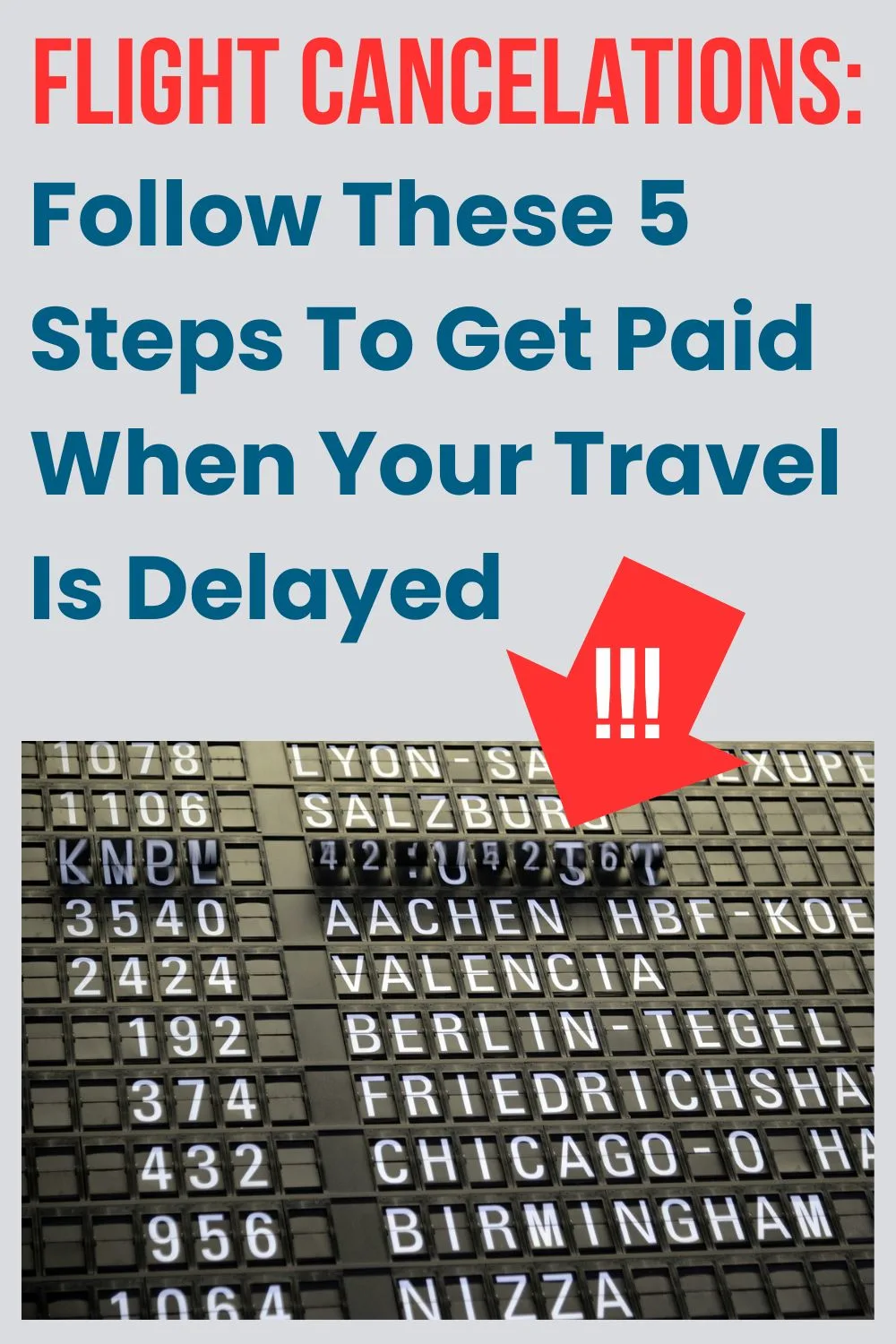The only thing worse than a flight cancelation on your vacation, is having it happen when you’re traveling with kids. You have to sort out re-booking, refunds, food vouchers and unplanned hotel stays just like everyone else. But there’s also managing disappointed, bored, tired and hungry kids.
These days, it’s common to encounter flight cancelations and significant delays that cause us to miss connections and disrupt our trips for hours or even days. Sometimes the delay is too long to make the trip worth it. While airline cancelations are unavoidable, it’s important to remember that you do have some passenger rights. Knowing them can make the bad news more palatable.
You might be entitled to compensation in more circumstances than you expect, especially if you’re traveling to, from or within the E.U. Here is everything you need to know if your flight is canceled, including five steps to help you get compensation you deserve, even when airlines are reluctant to pay out.
You might also like
• 6 Pro Tips for Saving Money on Holiday-Season Airfare
• Make Flying Time Quality Time WIth Your Kids
• 10 Tips for Flying Long Haul With a Baby
Flight Cancelations: 5 Steps To Getting Paid When Your Travel Is Delayed
If your flight is canceled, these steps will help you claim the assistance and compensation you’re entitled to:
1. Find out exactly why your flight has been canceled
The first step is to ask the airline why the flight cancelation has happened. This information is crucial because extraordinary circumstances usually let the airline off the hook.
Events that qualify as “extraordinary” are limited and very specific.
2. Request re-routing or a refund
Aside from compensation, you should be given the choice of a full refund for your tickets or being re-routed on another flight to your destination, including flights on other airlines.
If you opt for re-routing, the airline must offer you the earliest available flight. If you prefer not to travel anymore, you can request a refund instead. The refund should cover the full cost of the ticket for the part of the journey not made, and for parts of the journey already made if the flight no longer serves your intended purpose.
3. Make sure the airline takes care of you while you wait
Regardless of the reason for the cancelation, airlines are required to provide support — after a certain amount of time — while you wait for your alternative flight.
This support can include meals and refreshments; accommodation, if your new flight is not until the next day; transportation between the airport and your accommodation; and even free telephone calls, emails or faxes if you need to contact people and can’t use your cell phone.
4. Document Everything
If you think it’s at all possible that you’ll want to claim compensation, it’s essential to have a good paper trail.
Keep all your documentation including your boarding pass or e-ticket; any communication from the airline, such as emails or text messages, detailing the cancelation; a note of the time and date of any phone calls to the airline; and receipts for any money you had to spend because of the cancelation, such as food or hotel accommodations, if the airline does not provide these services.
5. File a Compensation Claim
As soon as you can after the flight cancelation happens, file a compensation claim with the airline. Many airlines, especially non-U.S. carriers, have online claim forms.
If they don’t, you can contact them via their customer service email address or the customer service contact form on their website.
When you file the claim, be sure to reference the relevant regulations, such as new rules passed by the Biden-Harris administration for U.S. carriers or relevant EU Regulations for European ones. And clearly outline the amount of compensation you are seeking and what it covers.

Understand Your Rights
When your flight is canceled, it’s crucial to understand your rights as a passenger.
Starting in early 2025, within the U.S., domestic airlines will have to issue automatic refunds if you don’t want the alternative arrangements they offer after a flight is canceled. You’re also entitled to a refund if your domestic flight is delayed by more than three hours or your international flight is delayed by more than six hours.
This means you should no longer have to file forms to receive the refund; it should happen once your flight is canceled and not rebooked. You might also be due compensation if your arrival airport changes or you’re asked to accept additional connections.
Other countries go beyond also ensure passengers aren’t left stranded without compensation.
In the European Union, for example, passengers are covered under EU Regulation 261/2004 (often abbreviated as EC 261), which sets out clear guidelines for compensation and assistance when your flight is canceled.
The good news is that you don’t have to be an EU citizen to benefit from those rules. You simply have to be departing from or arriving at an EU airport on an EU-based airline.
Other criteria are that the airline must inform you of the cancelation less than 14 days before the scheduled departure. And once again, the cancelation can’t have been caused by those extraordinary circumstances beyond the airline’s control.
How Much Compensation Will Airlines Pay?
For flights within the U.S., actual compensation, beyond re-booking or a refund, is largely at the discretion of the individual airline.
For E.U. airlines, cancelation compensation is laid out quite clearly:
- €250 for flights of 1,500 km or less.
- €400 for flights within the EU over 1,500 km and for all other flights between 1,500 km and 3,500 km.
- €600 for flights exceeding 3,500 km.
If your airline offers an alternate flight with a similar schedule and minimal delay, this compensation might be less.
Can An Airline Refuse To Pay Compensation?
Airlines will sometimes refuse to pay compensation even if they’re required to pay. This is where the support of external services or regulators comes in handy.
Organizations like AirHelp specialize in handling compensation claims, often taking the stress out of the process for passengers in exchange for a flat fee or a percentage of the compensation that’s delivered.
These services can help passengers file claims and even take airlines to court if necessary. They can be invaluable if you want to avoid the hassle of dealing with airlines directly.
For flights within the U.S., go to the Department of Transportation. For flights to, from or within the E.U., you can make a complaint with the National Enforcement Body (NEB) in the country where the flight interruption happened. Again, organizations like AirHelp can help you navigate that process.
So, What Are Extraordinary Circumstances?
As I mentioned earlier, airlines are off the hook for flight delays or cancelations caused by extraordinary circumstances.
These can include severe bad-weather conditions like heavy snowstorms or hurricanes, strikes not related to the airline itself (like air-traffic-controller strikes), political unrest or security risks and bird strikes that compromise a plane’s safety.
Of course, not all technical or operational problems are extraordinary. Mechanical failures, crew shortages and other logistical problems within the airline’s operations are usually considered ordinary and somewhat foreseeable, so you can still be entitled to refunds or compensation.
Flight cancelations are frustrating and inconvenient, especially for families. But understanding your rights and following the right steps to be compensated or at least get a timely refunt can help you to make the best of a bad situation.
Pin it for later!

Note: Sources for this story include European regulations, the U.S. Department of Transportation and guidelines outlined by compensation experts at AirHelp.
Photos: Flight Board (wal_172619/Pixabay); People at Flight Board (Geralt/Pixabay).

